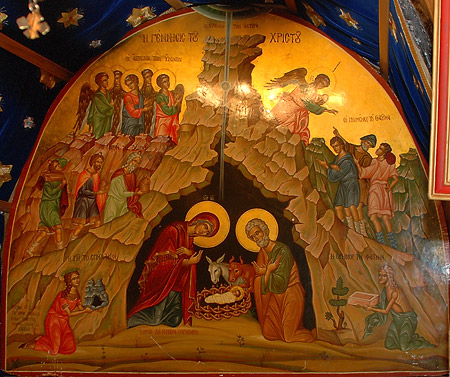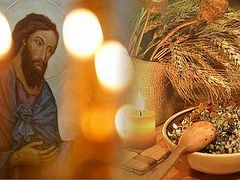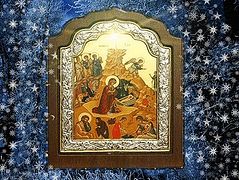A time of self-restraint and a time of prayer, a time of temptations and a time of joys: All of these relate to fasting—a special period in the life of every Orthodox Christian. Igumen Nektary (Morozov), the rector of the Church of the “Assuage My Sorrows” Icon of the Mother of God, speaks on the significance of the Nativity Fast and on the importance of even the very smallest ascetic podvig and the anticipation of the celebration.
 Icon from the Cave of the Nativity of Christ in Bethlehem. Photo: A. Pospelov / Pravoslavie.Ru
Icon from the Cave of the Nativity of Christ in Bethlehem. Photo: A. Pospelov / Pravoslavie.Ru
—We are used to holidays being a time of joy. Why do Orthodox Christians fast before the most significant celebrations?
—A holiday in the secular understanding and in the Church understanding are completely different things. In the world, preparation for a holiday means a shopping trip, making sure the table is covered with various foods, and thinking about how to occupy and entertain your guests. Such an approach is purely earthly. A Church feast is a celebration of another, spiritual order, giving believers the opportunity, through the remembrance of this or that event of sacred history, to touch the heart to another, Heavenly reality, and experience in all its fullness the joy of this amazing, incomparable touch.
But man consists of spirit, soul, and body. And his spirit and soul in his daily life are in a downtrodden, suppressed state—the body rules with its needs, habits, and pleasures. In order to give the spirit freedom in its striving for God, we have to “oppress” our flesh, at least somehow limiting its sometimes rather capricious demands. This way of self-restraint is fasting. In one form or another, such as restraint from excesses, it should always be present in the life of an Orthodox Christian. But throughout the Church year, there are particular periods specifically dedicated to greater temperance—the multi-day fasts, one of which is the Nativity Fast.
—It’s also known as the “Philip’s” Fast…
—Yes, because it begins on the day after the commemoration of the holy apostle Philip, on November 15/28. But it ends on Nativity, celebrated on December 25/January 7, and thus it lasts forty days. According to its regulations on food, it’s not the strictest. On Saturdays and Sundays, and also on feast days with a polyeleos,1 if they don’t land on a Wednesday or Friday, the Nativity Fast allows for eating fish, and the rest of the days—no meat or dairy. The last few days are the strictest part of the fast, during the forefeast—from December 20/January 2 to December 24/January 6 inclusive. On these days, even if they fall on a Sunday or Saturday or some feast, fish is not allowed. And the strictest day of all is the eve of Nativity, when, according to the Church typikon, it is customary to eat food only in the evening, with the appearance of the “first star” in the sky (around 4:00 or 5:00 PM).
—We’re talking now about the bodily side of the fast. But fasting is also necessary for the soul, correct?
—Yes, of course. Fasting bodily, we have to remember that the most important thing is the spiritual fast. Therefore, if someone limits himself in food but doesn’t go to church, but participates in some kind of entertainment or amusement, then his fasting will not bring tangible benefits—it will just be some kind of “diet,” nothing more. Without prayer during the services, it’s basically impossible to understand the inner meaning of the fast. Fasting for a Christian is a time when he can more substantially labor over his soul: to struggle within himself with those shortcomings with which he usually puts up with out of cowardice, to try to cultivate virtues within himself, which he realizes he has been unsuccessful at thus far. Then, the day of the feast, as the crown of his fasting, becomes a day of genuine joy and genuine spiritual celebration.
—What is the day of the Nativity to a believer?
—For us, the Nativity is the end of the Old Testament and the beginning of the new, that which the Old Testament righteous awaited with everyone who preserved faith in the true God from the moment that our forefathers transgressed the sole commandment that was given by God to the first-created Adam. This event, which changed the fate of mankind, is the beginning of our salvation.
The Church service itself prepares man for such an understanding of the Nativity. In the days of the forefeast (December 20/January 2-December 24/January 6), the same thought: “Christ is born, Christ is coming,” astounding in its depth and tenderness, is heard in the stichera and in the canon at Matins and Compline, rising to a crescendo. And this feeling, that “the Lord is coming,” becomes completely real.
I’ll give an example that’s a little personal, but very vivid. A friend of mine, a believer, but not living a completely Churched life, was serving in the army quite a while ago. On Nativity night, he was on patrol, and suddenly at some point, absolutely without any apparent reason, he suddenly felt that … the Lord was born. A striking, completely unexpected joy filled his heart. Evidently, some kind of mystery takes place on Nativity night—the mystery of the world remembering the most amazing moment in its history: how God became man that man might become God.
—How can we realize the necessity of fasting for ourselves?
—The commandment to fast is the most ancient. It was the first, given to the first-created man in Eden. And the podvig of fasting occupies a very prominent place in Church history. First of all, there is the memorable fast of the prophet Moses that preceded the presentation to him of the God-inscribed tablets. There’s a surprising contrast: On the one hand, Moses did not eat food for forty days to receive God’s covenant from Him. On the other hand, the Israelites, whom he was leading through the desert, were ready to return to Egypt, where they killed every firstborn of the Jewish families, because they didn’t have as much meat, onions, and garlic as they were used to in Egypt!
St. Ignatius (Brianchaninov) speaks remarkably about this: A proud man in self-delusion considers himself something significant, but as soon as his belly is constrained, it becomes obvious that he is its slave. Fasting is one of the means of freeing oneself from this bondage.
But the main thing for us here is the example of the Savior, Who, preparing for His ministry, undertook the same forty-day fast. Without needing such preparation, Himself, He showed us an image of how to prepare for important events in our lives.
—Fasting is difficult for modern man, living not in a monastic dormitory but in the middle of the world. Fasting sometimes seems like a strange anachronism to those around us, and sometimes simply obscurantism. Are any concessions possible in this regard for someone who is fasting?
—Certainly, fasting in the midst of the world is more difficult than in a monastery. Sometimes in families one person has come to God, while another doesn’t understand and accept the Church life and its rules, and thus there is no fasting food there as such. It’s also difficult when you spend the majority of your day at work, where there’s no chance to get quality fasting food. But difficult doesn’t mean impossible. Experience irrefutably shows that when a Christian decides to fast, he succeeds; all the obstacles are overcome.
There’s one more very significant aspect of fasting for someone living in the world. In this world, unchurched, not knowing God, we very often “dissolve” and lose ourselves in its events and affairs, and it forces us to forget who we are. And in this sense, fasting is a very effective means for remembering that you are an Orthodox believer. And at the same time, it’s a homily without words, because seeing someone who refuses something for the sake of God, people inevitably start respecting his faith. It often becomes an occasion for them to think and then ask about something important for themselves.
But, of course, deviations from the accepted typikon are possible if someone is sick and lacks the physical strength to keep it. Although it’s best to coordinate this with your priest, asking his blessing and counsel.
You know, physically we really are much weaker than our ancestors who showed amazing examples of self-restraint, and we cannot take their measure of asceticism upon ourselves. But we are weaker than them mentally and spiritually as well. Therefore, today, a priest has to condescend not only those who are bodily ill, alleviating their restraint for them with some indulgences. The modern Church-going person may not be ready for fasting purely psychologically. The thought that we have to renounce our usual food for forty days leads him to horror. And when you see that someone is fasting not so resolutely, then, in order not to push him away entirely, you can suggest some kind of “training” fast: to give up only meat and something modest the first time out. There’s hope that he will be ripe for stricter abstinence the next fast.
—Should a believer celebrate New Years during the Fast? What should you do if this holiday is very important for your loved ones?2
—Here we need spiritual reasoning. If you have Church people around you, it’s simple: By his own will, a believer shouldn’t spend all night watching TV specials or at a party or some other event. If not everyone in your family is a believer, then you have to find a good balance: not to deviate from the bodily fast, but to try to do it as imperceptibly as possible and not indulge in excessive fun. There can be no complete compromise. Rather, we should gently and lovingly do what the law of God and the Church canons oblige us to do.
—What else would you advise someone who’s fasting to be attentive to?
—To the fact that fasting isn’t just a time of hard ascetic podvig, but also a time of temptations. A spiritual law is revealed: Starting to try to live in a more disciplined way, you go out to the line of battle. A time of war is coming: Those forces that oppose all goodness in our life take up arms against us. But this doesn’t happen without the permission of God. As Abba Dorotheos says, every good deed is either preceded or followed by temptation.
Most often, the temptations of fasting are manifested in the exacerbation of existing conflicts or the emergence of new ones. In general, unfortunately, someone who is fasting sometimes becomes much more irritable, nervous… But knowing in advance that the Fast is a time of temptations, you can better prepare for them and endure them more placably. Prayer should be the main help in this. In general, believers usually increase their prayer rule when fasting: They read the Psalter, they do prostrations, and they try not to allow any omissions or abbreviations into their rule.
There’s something else I’d like to say. People, including believers, very easily forget about their duties. We’re constantly in need of incentives and reasons to be attentive to the important things we encounter in our everyday life. And the Fast is precisely that occasion, that incentive for collecting ourselves. But, unfortunately, with the end of the fast often comes a certain “backslide,” and you quickly lose the little you managed to gain. It’s very important to avoid this, so the Fast would be for us another, even if very small, step in our ascent to God; so we wouldn’t slide down from this step.



